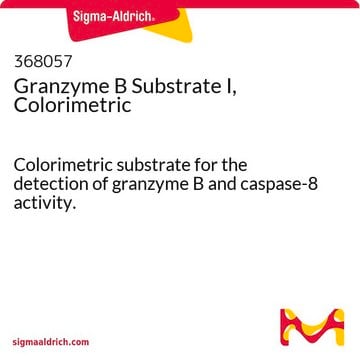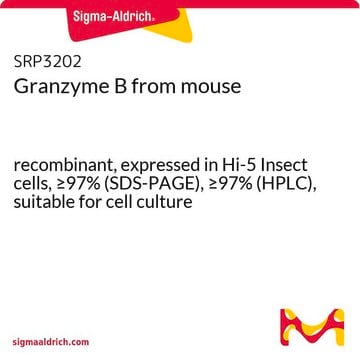368055
Granzyme B Inhibitor II
The Granzyme B Inhibitor II, also referenced under CAS 1258003-96-1, controls the biological activity of Granzyme B. This small molecule/inhibitor is primarily used for Cancer applications.
Synonym(s):
Granzyme B Inhibitor II, Caspase-8 Inhibitor I, Ac-IETD-CHO
Sign Into View Organizational & Contract Pricing
All Photos(1)
About This Item
Empirical Formula (Hill Notation):
C21H34N4O10
CAS Number:
Molecular Weight:
502.52
UNSPSC Code:
12352200
NACRES:
NA.77
Recommended Products
Quality Level
Assay
≥95% (HPLC)
form
lyophilized solid
manufacturer/tradename
Calbiochem®
storage condition
OK to freeze
color
white
solubility
DMSO: 1 mg/mL
shipped in
ambient
storage temp.
−20°C
General description
A potent, reversible inhibitor of granzyme B and caspase-8 (Ki = 1 nM). Also inhibits caspase-1 (<6 nM), caspase-6 (5.6 nM), and caspase-10 (27 nM).
Potent, reversible granzyme B and caspase-8 inhibitor.
Biochem/physiol Actions
Cell permeable: no
Product does not compete with ATP.
Reversible: yes
Target Ki: 1 nM against caspase-8
Warning
Toxicity: Standard Handling (A)
Sequence
Ac-Ile-Glu-Thr-Asp-CHO
Other Notes
Gao, C.F., et al. 2001. Exp. Cell. Res.265, 145.
Garcia-Calvo, M., et al. 1998. J. Biol. Chem.273, 32608.
Han, Z., et al. 1997. J. Biol. Chem. 272, 13422.
Garcia-Calvo, M., et al. 1998. J. Biol. Chem.273, 32608.
Han, Z., et al. 1997. J. Biol. Chem. 272, 13422.
Legal Information
CALBIOCHEM is a registered trademark of Merck KGaA, Darmstadt, Germany
Storage Class Code
11 - Combustible Solids
WGK
WGK 1
Flash Point(F)
Not applicable
Flash Point(C)
Not applicable
Certificates of Analysis (COA)
Search for Certificates of Analysis (COA) by entering the products Lot/Batch Number. Lot and Batch Numbers can be found on a product’s label following the words ‘Lot’ or ‘Batch’.
Already Own This Product?
Find documentation for the products that you have recently purchased in the Document Library.
Abdulla Berjis et al.
Nature communications, 15(1), 3937-3937 (2024-05-11)
Human natural killer (NK) cell-based therapies are under assessment for treating various cancers, but cryopreservation reduces both the recovery and function of NK cells, thereby limiting their therapeutic feasibility. Using cryopreservation protocols optimized for T cells, here we find that
Our team of scientists has experience in all areas of research including Life Science, Material Science, Chemical Synthesis, Chromatography, Analytical and many others.
Contact Technical Service








